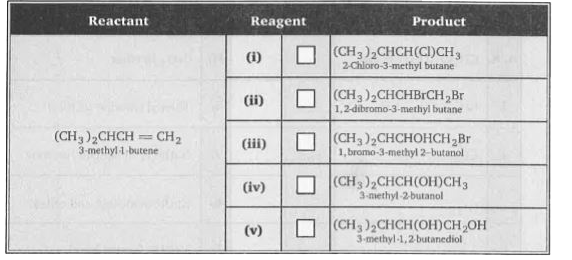Sum of molecular mass of A, B, C, D (i.e. A+B + C + D) is equal to :
 Solution in Kannada
Solution in Kannada
The correct Answer is:A+B+C + D = 312
Topper's Solved these Questions
Similar Questions

In each reagent box write a letter designating the best reagent and condition selected from the above list of reagents.
 07:06View Solution
07:06View Solution 02:49View Solution
02:49View SolutionComplete the following reaction
 01:26View Solution
01:26View SolutionIf a,b,c,d are distinct complex number and |a|=|b|=|c|=|d|=3,|a-b|=|b-c|=|c-d|=sqrt(3) then the value of |a-d| is equals to
02:21View SolutionIf a+b+c=αd,b+c+d=βaanda,b,c are non-coplanar, then the sum of a+b+c+d=
04:54View SolutionIf ab=bc=cd, thenb3+c3+d3a3+b3+c3 will be equal to ab b. bc c. cd d. da
04:30View SolutionIf A={a,b},B={c,d},C={d,e}, then {(a,c),(a,d),(a,e),(b,c),(b,d),(b,e)} is equal to
01:01View SolutionWhen two ratios are equal, then the four quantities compositing them are said to be proportiona. If ab=cd, then it is written a:b=c:dora:b::c:d. Also if ab=cd=λ⇒a=bλandc=dλ⇒ab=cd=a±cb±d=n√(a)n±(c)nn√(b)n±(d)n=λ(λ>0) important property of proportion :
1. If a:b=c:d,then
a+bb=c+dd(Componendo)i.e.ab=cd⇒ab+1=cd+1
2. If a:b=cd,then
a−bb=c−dd(Dividenod)i.e.ab=cd⇒ab−1=cd−1
3. If a:b:=c:d,then
a+ba−b=c+dc−d(Componendo and dividendo)
Ifa+3da+9d=a+da+5d=k, then k is equal to (a,d>0)03:05View SolutionIf a, b, c and d are four positive real numbers such that sum of a, b and c is even the sum of b,c and d is odd, then a2−d2 is necessarily
01:14View SolutionThe sum of a2andcb3 equals the sum of twice to d and thrice to c. express b in terms of a,c and d.
View Solutionयदि A={a,b},B={c,d} तथा C={d,e} तो {(a,c),(a,d),(a,e),(b,c),(b,d),(b,e)} बराबर है
03:38View Solutionयदि A={a,b,c,d} व B={b,d,a,c} क्या A एवं B बराबर है ?
03:11View SolutionLet A = {a,b,c,d} and R = {(a,b),(a,c),(a,d), (b,c), (b,d), (c,d)} then R =R is equal to
03:18View SolutionA quadrilateral ABCD is such that diagonal BD divides its area in two equal parts. Prove that BD bisects AC. GIVEN : A quadrilateral ABCD in which diagonal BD bisects it. i.e. ar(△ABD)=ar(△BDC) CONSTRUCTION : Join AC Suppose AC and BD intersect at O . Draw AM⊥BD and CN⊥BD. TO PROVE : AO=OC.
03:23View SolutionIf A={a,b},B={c,d},C={d,e}, then {(a,c),(a,d),(a,e),(b,c),(b,d),(b,e)} is equal to
02:57View SolutionWhen two ratios are equal, then the four quantities compositing them are said to be proportiona. If ab=cd, then it is written a:b=c:dora:b::c:d. Also if ab=cd=λ⇒a=bλandc=dλ⇒ab=cd=a±cb±d=n√(a)n±(c)nn√(b)n±(d)n=λ(λ>0) important property of proportion :
1. If a:b=c:d,then
a+bb=c+dd(Componendo)i.e.ab=cd⇒ab+1=cd+1
2. If a:b=cd,then
a−bb=c−dd(Dividenod)i.e.ab=cd⇒ab−1=cd−1
3. If a:b:=c:d,then
a+ba−b=c+dc−d(Componendo and dividendo)
Ifa+3da+9d=a+da+5d=k, then k is equal to (a,d>0)04:30View Solution


